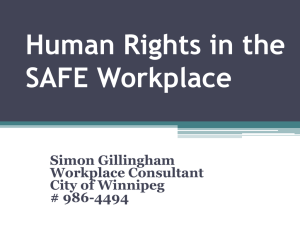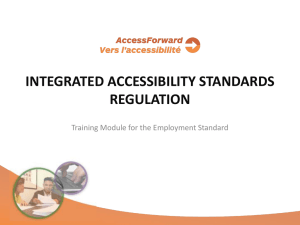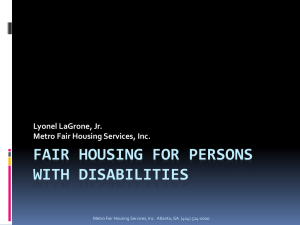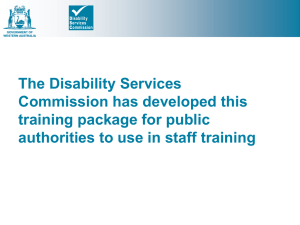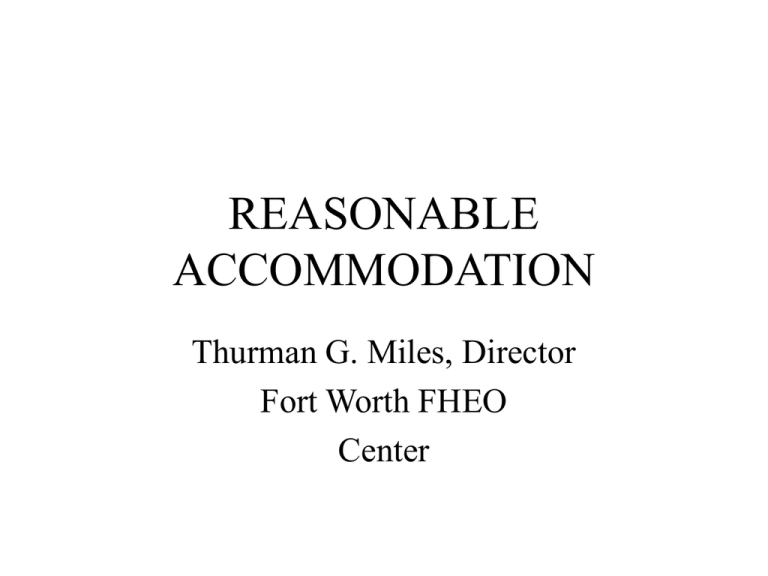
REASONABLE
ACCOMMODATION
Thurman G. Miles, Director
Fort Worth FHEO
Center
Disability discrimination
prohibited by FHA
• FHA prohibits discrimination against applicants or
residents because of their disability or anyone
associated with them.
• Unlawful for any person to refuse to make
reasonable accommodations in rules, policies,
practices or services, when such accommodation
may be necessary for persons with disabilities to
use and enjoy the dwelling.
Discrimination continued
• Unlawful to refuse residency to persons with
disabilities or placing conditions on their
residency because they may require reasonable
accommodations.
• In certain circumstances, the Act requires that
housing providers allows residents to make
reasonable structural modifications to units and
common areas when those modifications are
necessary for a person with a disability to have
full enjoyment of a dwelling.
Housing providers covered
• Privately owned
• Publicly owned
• Housing subsidized by
the federal
government
• Housing rented
through use of Section
8 vouchers
Who qualifies as a person with a
disability?
• Physical or mental impairment that substantially
limits one or more major life activities
• Individuals regarded as having such an
impairment
• Individuals with a record of such an impairment
• Substantially limits suggests the limitation is
significant or to a large degree
• Major life activity seeing, hearing, walking,
breathing, performing manual tasks, caring for
one’s self, learning, and speaking
PERSONS NOT COVERED
• Juvenile offenders, or sex offenders are not
persons with disabilities protected by the Act.
• Current illegal use of controlled substances
• Persons with a disability whose tenancy would
constitute a “direct threat” to the health or safety
of other individuals or result in substantial
physical damage to the property of others, unless
the threat can be eliminated or reduced by
reasonable accommodation.
DETERMINING IF A PERSON
POSES A DIRECT THREAT
• The Act does not allow for exclusion of
individuals based upon fear, speculation, or
stereotype about a particular disability or
persons with disabilities.
• Determination must rely on an
individualized assessment based on reliable
objective evidence.
Determination continued
• Nature, duration, and severity of the risk of injury;
• Probability that injury will actually occur
• Is there any reasonable accommodations that will
eliminate the direct threat?
• Any intervening treatment or medication that has
eliminated the direct threat.
• Provider must have reliable, objective evidence of
a direct threat before excluding the disabled
person.
EXAMPLE
• Application shows current residence as Cambridge
House.
• Provider knows Cambridge House is a group
home for women receiving treatment for
alcoholism.
• Based solely on that info & his personal belief that
alcoholics are likely to cause disturbances and
damage property, the manager rejects the
applicant.
EXAMPLE CONT’D
• Unlawful because
based on generalized
stereotype rather than
individualized
assessment
• Manager could have
checked references to
the same extent and
manner as other
applicants
What is a reasonable
accommodation?
• A change, exception or adjustment to a rule,
policy, practice, or service that may be
necessary for a person with a disability to
have an equal opportunity to use and enjoy
the dwelling
• There must be an identifiable relationship or
nexus between the requested
accommodation and the person’s disability.
EXAMPLE
• Provider has a no pets policy
• Deaf tenant request he be allowed to keep a dog as
a reasonable accommodation
• The tenant explains that the dog is an assistance
animal that will alert him to several sounds
including knocks at the door, sounding of the
smoke detector, phone, etc.
• Provider must make an exception to his no pets
policy to accommodate this tenant.
Any instances where a provider
can deny accommodation?
• If the request was not
made by or on behalf
of a person with a
disability
• Providing the
accommodation is not
reasonable
• Undue financial or
administrative burden
Undue financial or administrative
burden
• Must be determined on a case by case basis
– COSTS
– FINANCIAL RESOURCES OF PROVIDER
– BENEFITS THE ACCOMMODATION
WOULD PROVIDE THE REQUESTOR
– AVAILABILITY OF ALTERNATIVE
ACCOMMODATIONS THAT WOULD
MEED THE DISABILITY RELATED NEEDS
BURDEN CONT’D
• Discuss alternatives
with the requestor
• Determine whether
there is an alternative
that addresses the need
without a fundamental
alteration or undue
financial burden.
90
80
70
60
50
40
30
20
10
0
East
West
North
1st 2nd 3rd 4th
Qtr Qtr Qtr Qtr
FUNDAMENTAL
ALTERATION
• Modification that alters the essential nature
of provider’s operations.
• A failure to reach an agreement on an
accommodation request is in effect a denial.
• Housing providers may not require persons
with disabilities to pay extra deposits as a
condition of receiving a reasonable
accommodation.
How requested?
• Whenever a resident or applicant makes clear that
she is requesting an exception, change or
adjustment to a rule, policy, practice, or service
because of her disability.
• Type of accommodation should be explained
• If the need for the accommodation is not readily
apparent or known to provider, explain the
relationship between the accommodation
requested and her disability.
REQUEST CONTINUED
• The Act does not require that the request be made
in a particular manner or particular time.
• The request may be made by a family member or
someone else acting on her behalf.
• The requestor need not mention the works
“reasonable accommodation”, but it must be clear
that the request is an exception, change or
adjustment of a rule or policy.
• It is helpful if the request is in writing but not
required.
Failure to respond promptly
• Provider has an obligation to provide
prompt responses to reasonable
accommodation requests.
• Undue delays can be deemed a failure to
provide the accommodation.
Information a Provider can
request from a disabled person
• Information necessary to evaluate if a requested
accommodation may be necessary because of a
disability.
• If the person’s disability is obvious or otherwise
known to the provider, and if the need for the
accommodation is readily apparent, the provider
may not request any additional information about
the requestor’s disability of disability related need
for the accommodation.
Information Necessary
• Necessary to verify that the person meets the Act’s
definition of disability (reliable information)
• Information that describes the accommodation
• Information that shows the relationship between
the disability and the requested accommodation.
• Once this information is established, the provider
must provide the requested accommodation.
• Provider should only request information that is
necessary to evaluate the need for the
accommodation.
HUD/DOJ JOINT STATEMENT
• SOURCE OF THIS
INFORMATION
• Person may file a
complaint with HUD
within one year of the
occurrence of the alleged
denial.
• May file a lawsuit in
federal court within two
years of the occurrence.
• 1-888-560-8913 HUD


